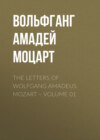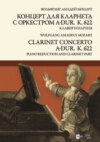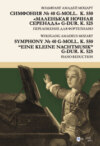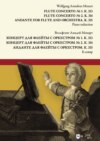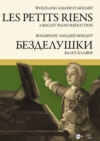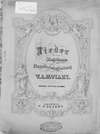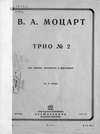Czytaj książkę: «The Letters of Wolfgang Amadeus Mozart – Volume 01», strona 10
You write to me that I ought to pay a good many visits in order to make new acquaintances, and to renew former ones. This is, however, impossible, from the distances being so great, and it is too muddy to go on foot, for really the mud in Paris is beyond all description. To go in a carriage entails spending four or five livres a day, and all for nothing; it is true the people say all kinds of civil things, but there it ends, as they appoint me to come on such and such a day, when I play, and hear them exclaim, "Oh! c'est un prodige, c'est inconcevable, c'est etonnant!" and then, Adieu! At first I spent money enough in driving about, and to no purpose, from not finding the people at home. Unless you lived here, you could not believe what an annoyance this is. Besides, Paris is much changed; the French are far from being as polite as they were fifteen years ago; their manner now borders on rudeness, and they are odiously self-sufficient.
I must proceed to give you an account of the Concert Spirituel. By the by, I must first briefly tell you that my chorus-labors were in a manner useless, for Holzbauer's Miserere was too long in itself, and did not please, so they gave only two of my choruses instead of four, and chose to leave out the best; but this was of no great consequence, for many there were not aware that any of the music was by me, and many knew nothing at all about me. Still, at the rehearsal great approbation was expressed, and I myself (for I place no great reliance on Parisian praise) was very much satisfied with my choruses. With regard to the sinfonie concertante there appears to be a hitch, and I believe that some unseen mischief is at work. It seems that I have enemies here also; where have I not had them? But this is a good sign. I was obliged to write the symphony very hurriedly, and worked very hard at it. The four performers were and are perfectly enchanted with the piece. Le Gros had it for the last four days to be copied, but I invariably saw it lying in the same place. Two days ago I could not find it, though I searched carefully among the music; and at last I discovered it hidden away. I took no notice, but said to Le Gros, "A propos, have you given my sinfonie to be copied?" "No; I forgot all about it." As, of course, I have no power to compel him to have it transcribed and performed, I said nothing; but I went to the concert on the two days when the sinfonie was to have been performed, when Ramm and Punto came to me in the greatest rage to ask me why my sinfonie concertante was not to be given. "I don't know. This is the first I hear of it. I cannot tell." Ramm was frantic, and abused Le Gros in the music-room in French, saying how very unhandsome it was on his part, etc. I alone was to be kept in the dark! If he had even made an excuse—that the time was too short, or something of the kind!—but he never said a syllable. I believe the real cause to be Cambini, an Italian maestro; for at our first meeting at Le Gros's, I unwittingly took the wind out of his sails. He composes quintets, one of which I heard at Mannheim; it was very pretty, so I praised it, and played the beginning to him. Ritter, Ramm, and Punto were all present, and gave me no peace till I agreed to continue, and to supply from my own head what I could not remember. I therefore did so, and Cambini was quite excited, and could not help saying, "Questa e una gran testa!" Well, I suppose after all he did not quite relish this, [The symphony in question has also entirely disappeared.]
If this were a place where people had ears to hear or hearts to feel, and understood just a little of music, and had some degree of taste, these things would only make me laugh heartily, but as it is (so far as music is concerned) I am surrounded by mere brute beasts. But how can it be otherwise? for in all their actions, inclinations, and passions, they are just the same. There is no place in the world like Paris. You must not think that I exaggerate when I speak in this way of the music here; refer to whom you will, except to a Frenchman born, and (if trustworthy) you will hear the same. But I am now here, and must endure it for your sake. I shall be grateful to Providence if I get away with my natural taste uninjured. I pray to God every day to grant me grace to be firm and steadfast here, that I may do honor to the whole German nation, which will all redound to His greater honor and glory, and to enable me to prosper and make plenty of money, that I may extricate you from your present emergencies, and also to permit us to meet soon, and to live together happily and contentedly; but "His will be done in earth as it is in heaven." I entreat you, dearest father, in the meantime, to take measures that I may see Italy, in order to bring me to life again. Bestow this great happiness upon me, I implore you! I do hope you will keep up your spirits; I shall cut my way through here as I best can, and trust I shall get off safely. Adieu!
103.
Paris, May 14, 1778.
I HAVE already so much to do that I don't know how I am to manage when winter comes. I think I wrote to you in my last letter that the Duc de Guines, whose daughter is my pupil in composition, plays the flute inimitably, and she the harp magnificently; she has a great deal of talent and genius, and, above all, a wonderful memory, for she plays all her pieces, about 200 in number, by heart. She, however, doubts much whether she has any genius for composition, especially as regards ideas or invention; but her father (who, entre nous, is rather too infatuated about her) declares that she certainly has ideas, and that she is only diffident and has too little self-reliance. Well, we shall see. If she acquires no thoughts or ideas, (for hitherto she really has none whatever,) it is all in vain, for God knows I can't give her any! It is not the father's intention to make her a great composer. He says, "I don't wish her to write operas, or arias, or concertos, or symphonies, but grand sonatas for her instrument and for mine." I gave her to-day her fourth lesson on the rules of composition and harmony, and am pretty well satisfied with her. She made a very good bass for the first minuet, of which I had given her the melody, and she has already begun to write in three parts; she can do it, but she quickly tires, and I cannot get her on, for it is impossible to proceed further as yet; it is too soon, even if she really had genius, but, alas! there appears to be none; all must be done by rule; she has no ideas, and none seem likely to come, for I have tried her in every possible way. Among other things it occurred to me to write out a very simple minuet, and to see if she could not make a variation on it. Well, that utterly failed. Now, thought I, she has not a notion how or what to do first. So I began to vary the first bar, and told her to continue in the same manner, and to keep to the idea. At length this went tolerably well. When it was finished, I told her she must try to originate something herself—only the treble of a melody. So she thought it over for a whole quarter of an hour, AND NOTHING CAME. Then I wrote four bars of a minuet, saying to her, "See what an ass I am! I have begun a minuet, and can't even complete the first part; be so very good as to finish it for me." She declared this was impossible. At last, with great difficulty, SOMETHING CAME, and I was only too glad that ANYTHING AT ALL CAME. I told her then to complete the minuet—that is, the treble only. The task I set her for the next lesson was to change my four bars, and replace them by something of her own, and to find out another beginning, even if it were the same harmony, only changing the melody. I shall see to-morrow what she has done.
I shall soon now, I think, receive the poetry for my two-act opera, when I must first present it to the Director, M. de Vismes, to see if he will accept it; but of this there can be no doubt, as it is recommended by Noverre, to whom De Vismes is indebted for his situation. Noverre, too, is soon to arrange a new ballet, for which I am to write the music. Rudolf (who plays the French horn) is in the royal service here, and a very kind friend of mine; he understands composition thoroughly, and writes well. He has offered me the place of organist at Versailles if I choose to accept it: the salary is 2000 livres a year, but I must live six months at Versailles and the remaining six in Paris, or where I please. I don't, however, think that I shall close with the offer; I must take the advice of good friends on the subject. 2000 livres is no such very great sum; in German money it may be so, but not here. It amounts to 83 louis-d'or 8 livres a year—that is, 915 florins 45 kreutzers of our money, (which is certainly a considerable sum,) but only to 383 ecus 2 livres, and that is not much, for it is frightful to see how quickly a dollar goes here! I am not at all surprised that so little is thought of a louis-d'or in Paris, for it does not go far. Four dollars, or a louis-d'or, which are the same, are gone in no time. Adieu!
104.
Paris, May 29, 1778.
I AM pretty well, thank God! but still I am often puzzled to know what to make of it all. I feel neither hot nor cold, and don't take much pleasure in anything. What, however, cheers and strengthens me most is the thought that you, dearest papa, and my dear sister, are well; that I am an honest German, and though I cannot SAY, I may at all events THINK what I please, and, after all, that is the chief thing. Yesterday I was for the second time at Count Sickingen's, ambassador from the Elector Palatine; (I dined there once before with Wendling and Ramm.) I don't know whether I told you what a charming man he is, and a great connoisseur and devoted lover of music. I passed eight hours quite alone with him. The whole forenoon, and afternoon too, till ten o'clock at night, we were at the piano, playing all kind of music, praising, admiring, analyzing, discussing, and criticizing. He has nearly thirty scores of operas. I must not forget to tell you that I had the satisfaction of seeing your "School for the Violin" translated into French; I believe it is about eight years since the translation appeared. I have just returned from a music-shop where I went to buy a sonata of Schobert's for one of my pupils, and I mean to go again soon to examine the book more closely, that I may write to you about it minutely, for to-day I have not time to do this.
105.
Paris, June 12, 1778.
I MUST now write something that concerns our Raaff. [Footnote: Mozart wrote the part of Idomeneo for Raaff in the year 1781.] You no doubt remember that I did not write much in his favor from Mannheim, and was by no means satisfied with his singing—in short, that he did not please me at all. The cause, however, was that I can scarcely say I really heard him at Mannheim. The first time was at the rehearsal of Holzbauer's "Gunther," when he was in his every-day clothes, his hat on his head, and a stick in his hand. When he was not singing, he stood looking like a sulky child. When he began to sing the first recitative, it went tolerably well, but every now and then he gave a kind of shriek, which I could not bear. He sang the arias in a most indolent way, and yet some of the notes with too much emphasis, which is not what I like. This has been an invariable habit of his, which the Bernacchi school probably entails; for he is a pupil of Bernacchi's. At court, too, he used to sing all kinds of airs which, in my opinion, by no means suited his voice; so he did not at all please me. When at length he made his debut here in the Concert Spirituel, he sang Bach's scena, "Non so d' onde viene" which is, besides, my great favorite, and then for the first time I really heard him sing, and he pleased me—that is, in this class of music; but the style itself, the Bernacchi school, is not to my taste. He is too apt to fall into the cantabile. I admit that, when he was younger and in his prime, this must have made a great impression and taken people by surprise; I could like it also, but there is too much of it, and it often seems to me positively ludicrous. What does please me in him is when he sings short pieces—for instance, andantinos; and he has likewise certain arias which he gives in a manner peculiar to himself. Let each occupy his proper place. I fancy that bravura singing was once his forte, which is even still perceptible in him, and so far as age admits of it he has a good chest and a long breath; and then his andantino! His voice is fine and very pleasing; if I shut my eyes and listen to him, I think his singing very like Meissner's, only Raaff's voice seems to me more agreeable. I speak of the present time, for I never heard either in his best days. I can therefore only refer to their style or method of singing, for this a singer always retains. Meissner, as you know, had the bad habit of purposely making his voice tremble at times,—entire quavers and even crotchets, when marked sostenuto,—and this I never could endure in him. Nothing can be more truly odious; besides, it is a style of singing quite contrary to nature. The human voice is naturally tremulous, but only so far as to be beautiful; such is the nature of the voice, and it is imitated not only on wind instruments, but on stringed instruments, and even on the piano. But the moment the proper boundary is passed it is no longer beautiful, because it becomes unnatural. It seems to me then just like an organ when the bellows are panting. Now Raaff never does this,—in fact, he cannot bear it. Still, so far as a genuine cantabile goes, Meissner pleases me (though not altogether, for he also exaggerates) better than Raaff. In bravura passages and roulades, Raaff is indeed a perfect master, and he has such a good and distinct articulation, which is a great charm; and, as I already said, his andantinus and canzonetti are delightful. He composed four German songs, which are lovely. He likes me much, and we are very intimate; he comes to us almost every day. I have dined at least six times with Count von Sickingen, and always stay from one o'clock till ten. Time, however, flies so quickly in his house that it passes quite imperceptibly. He seems fond of me, and I like very much being with him, for he is a most friendly, sensible person, possessing excellent judgment and a true insight into music, I was there again to-day with Raaff. I took some music with me, as the Count (long since) asked me to do so. I brought my newly completed symphony, with which, on Corpus Christi day, the Concert Spirituel is to commence. The work pleased them both exceedingly, and I am also well satisfied with it. Whether it will be popular here, however, I cannot tell, and, to say the truth, I care very little about it. For whom is it to please? I can answer for its pleasing the few intelligent Frenchmen who may be there; as for the numskulls—why, it would be no great misfortune if they were dissatisfied. I have some hope, nevertheless, that even the dunces among them may find something to admire. Besides, I have been careful not to neglect le premier coup d'archet; and that is sufficient. All the wiseacres here make such a fuss on that point! Deuce take me if I can see any difference! Their orchestra begins all at one stroke, just as in other places. It is too laughable! Raaff told me a story of Abaco on this subject. He was asked by a Frenchman, in Munich or elsewhere,—"Monsieur, vous avez ete a Paris?" "Oui." "Est-ce que vous etiez au Concert Spirituel?" "Oui." "Que dites-vous du premier coup d'archet? avez-vous entendu le premier coup d'archet?" "Oui, j'ai entendu le premier et le dernier." "Comment le dernier? que veut dire cela?" "Mais oui, le premier et le dernier; et le dernier meme m'a donne plus de plaisir." [Footnote: The imposing impression produced by the first grand crash of a numerous orchestra, commencing with precision, in tutti, gave rise to this pleasantry.] A few days afterwards his kind mother was taken ill. Even in her letters from Mannheim she often complained of various ailments, and in Paris also she was still exposed to the discomfort of cold dark lodgings, which she was obliged to submit to for the sake of economy; so her illness soon assumed the worst aspect, and Mozart experienced the first severe trial of his life. The following letter is addressed to his beloved and faithful friend, Abbe Bullinger, tutor in Count Lodron's family in Salzburg.
(Private.) 106.
Paris, July 3, 1778.
MY VERY DEAR FRIEND,—
Mourn with me! This has been the most melancholy day of my life; I am now writing at two o'clock in the morning. I must tell you that my mother, my darling mother, is no more. God has called her to Himself; I clearly see that it was His will to take her from us, and I must learn to submit to the will of God. The Lord giveth, and the Lord taketh away. Only think of all the distress, anxiety, and care I have endured for the last fourteen days. She died quite unconscious, and her life went out like a light. She confessed three days before, took the sacrament, and received extreme unction. The last three days, however, she was constantly delirious, and to-day, at twenty minutes past five o'clock, her features became distorted, and she lost all feeling and perception. I pressed her hand, I spoke to her, but she did not see me, she did not hear me, and all feeling was gone. She lay thus till the moment of her death, five hours after, at twenty minutes past ten at night. There was no one present but myself, Herr Heiner, a kind friend whom my father knows, and the nurse. It is quite impossible for me to describe the whole course of the illness to-day. I am firmly convinced that she must have died, and that God had so ordained it. All I would ask of you at present is to act the part of a true friend, by preparing my father by degrees for this sad intelligence. I have written to him by this post, but only that she is seriously ill; and now I shall wait for your answer and be guided by it. May God give him strength and courage! My dear friend, I am consoled not only now, but have been so for some time past. By the mercy of God I have borne it all with firmness and composure. When the danger became imminent, I prayed to God for only two things—a happy death for my mother, and strength and courage for myself; and our gracious God heard my prayer and conferred these two boons fully on me. I entreat you, therefore, my best friend, to watch over my father for me; try to inspire him with courage, that the blow may not be too hard and heavy on him when he learns the worst. I also, from my heart, implore you to comfort my sister. Pray go straight to them, but do not tell them she is actually dead—only prepare them for the truth. Do what you think best, say what you please; only act so that my mind may be relieved, and that I may not have to dread another misfortune. Support and comfort my dear father and my dear sister. Answer me at once, I entreat. Adieu! Your faithful
W. A. M.
107.
Paris, July 3, 1778.
MONSIEUR MON TRES-CHER PERE,—
I have very painful and sad news to give you, which has, in fact, been the cause of my not having sooner replied to your letter of the 11th. My dearest mother is very ill. She has been bled according to her usual custom, which was indeed very necessary; it did her much good, but a few days afterwards she complained of shivering and feverishness; then diarrhoea came on and headache. At first we only used our home remedies, antispasmodic powders; we would gladly have had recourse to the black powder, but we had none, and could not get it here. As she became every moment worse, could hardly speak, and lost her hearing, so that we were obliged to shout to her, Baron Grimm sent his doctor to see her. She is very weak, and still feverish and delirious. They do give me some hope, but I have not much. I hoped and feared alternately day and night for long, but I am quite reconciled to the will of God, and hope that you and my sister will be the same. What other resource have we to make us calm? More calm, I ought to say; for altogether so we cannot be. Whatever the result may be, I am resigned, knowing that it comes from God, who wills all things for our good, (however unaccountable they may seem to us;) and I do firmly believe (and shall never think otherwise) that no doctor, no man living, no misfortune, no casualty, can either save or take away the life of any human being—none but God alone. These are only the instruments that He usually employs, but not always; we sometimes see people swoon, fall down, and be dead in a moment. When our time does come, all means are vain,—they rather hurry on death than retard it; this we saw in the case of our friend Hefner. I do not mean to say by this that my mother will or must die, or that all hope is at an end; she may recover and be restored to health, but only if the Lord wills it thus. After praying to God with all my strength for health and life for my darling mother, I like to indulge in such consolatory thoughts, and, after doing so, I feel more cheerful and more calm and tranquil, and you may easily imagine how much I require comfort. Now for another subject. Let us put aside these sad thoughts, and still hope, but not too much; we must place our trust in the Lord, and console ourselves by the thought that all must go well if it be in accordance with the will of the Almighty, as he knows best what is most profitable and beneficial both for our temporal and spiritual welfare.
I have composed a symphony for the opening of the Concert Spirituel, which was performed with great applause on Corpus Christi day. I hear, too, that there is a notice of it in the "Courrier de l'Europe," and that it has given the greatest satisfaction. I was very nervous during the rehearsal, for in my life I never heard anything go so badly. You can have no idea of the way in which they scraped and scrambled through my symphony twice over; I was really very uneasy, and would gladly have had it rehearsed again, but so many things had been tried over that there was no time left. I therefore went to bed with an aching heart and in a discontented and angry spirit. Next day I resolved not to go to the concert at all; but in the evening, the weather being fine, I made up my mind at last to go, determined that if it went as badly as at the rehearsal, I would go into the orchestra, take the violin out of the hands of M. La Haussaye, the first violin, and lead myself. I prayed to God that it might go well, for all is to His greater honor and glory; and ecce, the symphony began, Raaff was standing beside me, and just in the middle of the allegro a passage occurred which I felt sure must please, and there was a burst of applause; but as I knew at the time I wrote it what effect it was sure to produce, I brought it in once more at the close, and then rose shouts of "Da capo!" The andante was also liked, but the last allegro still more so. Having observed that all last as well as first allegros here begin together with all the other instruments, and generally unisono, mine commenced with only two violins, piano for the first eight bars, followed instantly by a forte; the audience, as I expected, called out "hush!" at the soft beginning, and the instant the forte was heard began to clap their hands. The moment the symphony was over I went off in my joy to the Palais Royal, where I took a good ice, told over my beads, as I had vowed, and went home, where I am always happiest, and always shall be happiest, or in the company of some good, true, upright German, who, so long as he is unmarried, lives a good Christian life, and when he marries loves his wife, and brings up his children properly.
I must give you a piece of intelligence that you perhaps already know—namely, that the ungodly arch-villain Voltaire has died miserably like a dog—just like a brute. This is his reward! You must long since have remarked that I do not like being here, for many reasons, which, however, do not signify as I am actually here. I never fail to do my very best, and to do so with all my strength. Well, God will make all things right. I have a project in my head, for the success of which I daily pray to God. If it be His almighty will, it must come to pass; but, if not, I am quite contented. I shall then at all events have done my part. When this is in train, and if it turns out as I wish, you must then do your part also, or the whole work would be incomplete. Your kindness leads me to hope that you will certainly do so. Don't trouble yourself by any useless thoughts on the subject; and one favor I must beg of you beforehand, which is, not to ask me to reveal my thoughts more clearly till the time comes. It is very difficult at present to find a good libretto for an opera. The old ones, which are the best, are not written in the modern style, and the new ones are all good for nothing; for poetry, which was the only thing of which France had reason to be proud, becomes every day worse, and poetry is the only thing which requires to be good here, for music they do not understand. There are now two operas in aria which I could write, one in two acts, and the other in three. The two-act one is "Alexandra et Roxane," but the author of the libretto is still in the country; the one in three acts is "Demofonte" (by Metastasio). It is a translation interspersed with choruses and dancing, and specially adapted to the French stage. But this one I have not yet got a sight of. Write to me whether you have Schroter's concertos in Salzburg, or Hullmandell's sonatas. I should like to buy them to send to you. Both of them are beautiful. With regard to Versailles, it never was my intention to go there. I asked the advice of Baron Grimm and other kind friends on the point, and they all thought just as I did. The salary is not much, and I should be obliged to live a dreary life for six months in a place where nothing is to be gained, and my talents completely buried. Whoever enters the king's service is forgotten in Paris; and then to become an organist! A good appointment would be most welcome to me, but only that of a Capellmeister, and a well-paid one too.
Now, farewell! Be careful of your health; place your trust in God, and then you will find consolation. My dearest mother is in the hands of the Almighty. If He still spares her to us, as I wish He may, we will thank Him for this blessing, but if He takes her to Himself, all our anguish, misery, and despair can be of no avail. Let us rather submit with firmness to His almighty will, in the full conviction that it will prove for our good, as he does nothing without a cause. Farewell, dearest papa! Do what you can to preserve your health for my sake.
108.
Paris, July 9, 1778.
I HOPE you are prepared to receive with firmness most melancholy and painful intelligence. My last letter of the 3d must have shown you that no good news could be hoped for. That very same day, the 3d, at twenty minutes past ten at night, my mother fell asleep peacefully in the Lord; indeed, when I wrote to you she was already in the enjoyment of heavenly bliss, for all was then over. I wrote to you in the night, and I hope you and my dear sister will forgive me for this slight but very necessary deception; for, judging of your grief and sorrow by my own, I could not prevail on myself to startle you suddenly by such dreadful intelligence; but I hope you have now summoned up courage to hear the worst, and that, after at first giving way to natural and only too just anguish and tears, you will eventually submit to the will of God, and adore His inscrutable, unfathomable, and all-wise providence. You can easily conceive what I have had to endure, and what courage and fortitude I required to bear with composure seeing her become daily worse and worse; and yet our gracious God bestowed this boon on me. I have, indeed, suffered and wept, but what did it avail? So I strove to be comforted, and I do hope, my dear father, that my dear sister and you will do likewise. Weep, weep, as you cannot fail to weep, but take comfort at last; remember that God Almighty has ordained it, and how can we rebel against Him? Let us rather pray to Him and thank Him for His goodness, for she died a happy death. Under these heart-rending circumstances there were three things that consoled me—my entire and steadfast submission to the will of God, and the sight of her easy and blessed death, which made me feel that in a moment she had become so happy; for how far happier is she now than we are! Indeed, I would fain at that moment have gone with her. From this wish and longing proceeded my third source of consolation—namely, that she is not lost to us forever, that we shall see her again, and live together far more happily and blessedly than in this world. The time as yet we know not, but that does not disturb me; when God wills it I am ready. His heavenly and holy will has been fulfilled. Let us therefore pray a pious Vater unser for her soul, and turn our thoughts to other matters, for there is a time for everything.
I write this in the house of Madame d'Epinay and M. Grimm, with whom I now live; I have a pretty little room with a very agreeable prospect, and am as happy as it is possible to be under my present circumstances. It will be a great aid in restoring my tranquillity, to hear that my dear father and sister submit with calmness and fortitude to the will of God, and trust Him with their whole heart, in the entire belief that He orders all for the best. My dearest father, do not give way! My dearest sister, be firm! You do not as yet know your brother's kind heart, because he has not yet had an opportunity to prove it. Remember, my loved ones both, that you have a son and a brother anxious to devote all his powers to make you happy, knowing well that the day must come when you will not be hostile to his wish and his desire,—not certainly such as to be any discredit to him,—and that you will do all that lies in your power to make him happy. Oh! then we shall all live together as peacefully, honorably, and contentedly as it is possible to do in this world, and at last in God's good time all meet again above—the purpose for which we were destined and created.
